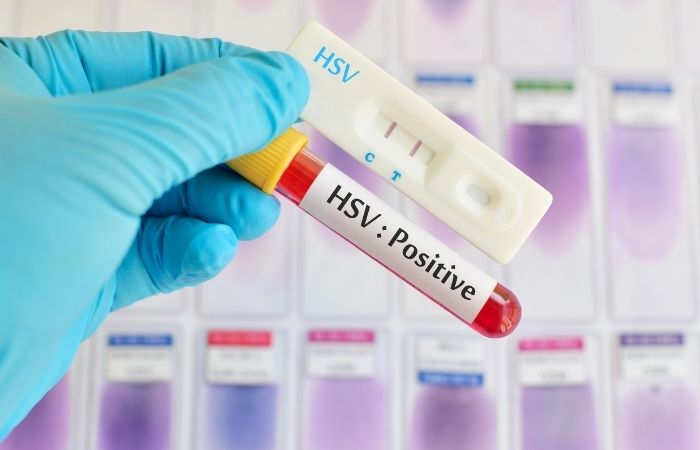Can You Have Herpes for Years Without Knowing?
Quick Answer: Herpes type (HSV-1 vs HSV-2) doesn’t always match where the outbreak shows up. HSV-1 can cause genital herpes, and HSV-2 can infect the mouth. Your test result tells you the type, not the location, only symptoms, history, and timing fill in the full picture.
This Isn’t Just Cold Sores vs Genital Sores
Emily, 27, thought she had a urinary tract infection. Her groin was sore, she felt run down, and her doctor ordered a full STD panel “just in case.” When the call came in, it wasn’t a UTI. It was HSV-1, and she was floored. “But I’ve never had a cold sore,” she told the nurse. “And I didn’t even go down on anyone recently.”
Here’s what Emily didn’t know: HSV-1, the virus most people associate with oral cold sores, can absolutely cause genital herpes. And it does. A lot. In fact, in many countries (including the U.S.), more cases of new genital herpes in women under 30 are now caused by HSV-1, not HSV-2 (CDC).
Meanwhile, HSV-2, the type long blamed for “real” genital herpes, can infect the mouth, especially during oral sex. The point? If you’re trying to figure out your type based on where symptoms show up, stop. Herpes is promiscuous. Location doesn’t tell the whole story. Only testing does.
Why Location Doesn’t Guarantee Type
Still convinced cold sores = HSV-1 and genital outbreaks = HSV-2? Let’s look at what the virus actually does, because real life isn’t that tidy. This table unpacks the overlap between site, symptoms, and type.
Figure 1. Why Location Doesn’t Guarantee Type: Herpes can show up anywhere mucous membranes exist, and both HSV-1 and HSV-2 are guilty parties.
What Your Test Is (and Isn’t) Telling You
If you’ve had a blood test for herpes, it likely told you whether you have antibodies for HSV-1 or HSV-2. It did not tell you where the infection lives in your body. And unless you were actively having an outbreak that got swabbed and typed, it also didn’t confirm if the virus is active or transmissible right now.
So here’s the messy truth:
- If you test positive for HSV-1: You may have had oral herpes for years. Or, you may have recently acquired it genitally.
- If you test positive for HSV-2: It’s usually genital, but it could be oral, especially if you give unprotected oral sex.
- If you test negative for both: That doesn’t guarantee you’re not infected. Blood tests can miss early infections, especially in the first 4–12 weeks.
Still feeling confused? You’re not alone. Herpes testing is notoriously vague unless it’s done right. For peace of mind, many people choose a combined approach: rapid screening plus symptom awareness plus retesting if needed. Our Genital & Oral Herpes At‑Home STD Test Kit can screen discreetly for multiple infections, including herpes type 2.

People are also reading: Got Lucky on Vacation? You Might Not Be So Lucky Now
The Problem with “Cold Sore Herpes” and “Genital Herpes” Labels
The public, and frankly, a lot of health providers, still divide herpes into “harmless cold sores” (HSV-1) and “bad STDs” (HSV-2). This is false, harmful, and makes diagnosis feel like a punishment instead of a piece of useful information.
Genital HSV-1 can be painful, recurrent, and emotionally draining. Oral HSV-2 is rare but can happen. Both types can cause outbreaks, both can be transmitted without visible symptoms, and both are forever viruses managed with daily suppressive therapy, communication, and smart precautions.
So if someone tries to downplay your HSV-1 status or overreact to HSV-2, remember: the virus doesn’t care what name you give it. It only cares about access. And that’s usually skin, not stereotypes.
HSV-1 and HSV-2: Where They Spread and How Likely
Still trying to figure out how you even got herpes in the first place? Welcome to the confusion club. Most people with herpes never find the “smoking gun” moment, because the virus spreads silently and shows up late. The chart below breaks down where each type tends to land and how likely it is to recur or be passed on.
Figure 2. HSV-1 and HSV-2: Both types can infect either region, but patterns of recurrence and silent shedding differ, and that matters for transmission.
Silent Symptoms and Surprise Diagnoses
Jason, 34, had never had a cold sore or any visible herpes outbreak. His last partner had “a fever blister, but it’s nothing,” and they hooked up without protection. Months later, Jason tested positive for HSV-2. He was shocked. “I would’ve known if I had herpes,” he insisted. But that’s the thing, most people don’t.
Up to 90% of people with HSV-2 and over 60% of those with HSV-1 have no noticeable symptoms at all (WHO). Others misdiagnose outbreaks as razor burn, ingrown hairs, or yeast infections. In Jason’s case, he’d had some redness he thought was from exercise. That was the outbreak.
Herpes doesn’t always show up dramatically. It doesn’t ask for permission. And it often shows up long after the exposure that caused it. That’s why testing, and retesting when needed, matters more than guessing based on symptoms.
Why It Matters to Know Your Type
Even though herpes types don’t map cleanly onto location, knowing which one you have still matters. Here’s why:
- Recurrence planning: Genital HSV-2 tends to recur more often than HSV-1. If you’re getting frequent outbreaks, it’s more likely to be HSV-2, and your provider might recommend daily suppressive antivirals.
- Transmission strategy: HSV-2 is more likely to be transmitted asymptomatically than HSV-1, especially in the genital region. That might shape how you talk to partners or use protection.
- Mental health: Knowing your type can help you understand what to expect and avoid panic when symptoms show up. HSV-1 genital infections often have fewer recurrences.
That said, your type isn’t your destiny. And it’s not a judgment on your worth, history, or future. It’s information. And you get to decide what to do with it.
Let’s Talk Suppression, Not Shame
If your results came back and you feel like you’ve just lost control of your body, pause. You haven’t. You now know something most people don’t, and that gives you power.
Antiviral medications like acyclovir, valacyclovir (Valtrex), and famciclovir can reduce symptoms, speed healing, and lower the chances of passing the virus on (CDC Treatment Guidelines). Some people take them only during outbreaks; others use daily suppression to minimize recurrence and reduce shedding risk. Talk to a clinician about your goals and what makes sense for your body and lifestyle.
If you're still not sure what kind of herpes test is best for you, or if your current one left you with more questions than answers, it may be time to test again. You can do that privately, from home, without booking an awkward appointment. Our homepage has the right kits, and none of the judgment.
“I Thought It Was Just a Cold Sore”
Shelby, 22, had oral HSV-1 for years, she got cold sores once or twice a year during midterms. But after a weekend with a new partner, she developed sores on her labia. Her doctor told her it was “probably HSV-2” and did a swab. The results? HSV-1 again.
“I didn’t even know the same virus could do that. I thought I was safe because I already had it in my mouth. But I guess not?”
What happened? It wasn’t a new infection, it was autoinoculation. Shelby had touched her mouth during an outbreak, then her genitals, and transferred the virus. This isn’t common, but it can happen, especially in people with new or weakened immunity.
Herpes doesn’t follow your assumptions. It follows opportunity. That’s why handwashing, waiting for sores to heal, and using barrier protection during oral sex all matter, even when you think you “already have it.”
Retesting, Reinfection, and “Do I Have Both?”
It’s the question no one wants to ask but everyone Googles at 3AM: Can you get both HSV-1 and HSV-2?
The short answer is yes. It’s rare, but possible, especially if you have one type in your mouth and then get exposed genitally to the other. Having one type offers partial immunity, but not full protection (PubMed). So yes, you can have HSV-1 orally and later acquire HSV-2 genitally, or vice versa. That’s why using protection still matters, even if both you and a partner have “some kind of herpes.”
Retesting is smart in these scenarios:
- Your first test was soon after exposure (less than 12 weeks).
- You had an outbreak but didn’t get it swabbed.
- You’re managing HSV-1 and start getting symptoms in a new location.
- A partner tells you they’ve tested positive, and you haven’t tested recently.
Timing matters. Herpes antibodies can take weeks to show up. If your first test was too soon, a follow-up test at 12–16 weeks gives a clearer picture.
Use this decision logic: If something doesn’t feel right, or still feels unclear, test again. You’re not being paranoid. You’re being thorough.

People are also reading: From Wilmington to Sussex: Delaware’s Chlamydia Hotspots
When the Test Isn’t Enough: Talking to Partners
Talking about herpes sucks. There’s no emoji for it, no dating app badge, no perfect script. But here’s what helps: honesty, calmness, and facts. Most people have some form of HSV, whether they know it or not. What matters is how you communicate and what steps you take to protect each other.
“Hey, before we go further, I want to be real with you, I have HSV-1. A lot of people do, but it can be passed even without symptoms. I just want you to have the full picture.”
If someone reacts with fear or judgment, that’s not about you, it’s about what they haven’t learned yet. If they respond with care, welcome to adulthood. Being informed isn’t a dealbreaker; it’s the bare minimum. And if they ghost you afterward? You just dodged a future shame spiral. You win.
FAQs
1. Can HSV-1 actually cause genital herpes?
Yes, and it does, all the time. If you’ve had unprotected oral sex, HSV-1 can land below the belt. It doesn’t care about labels. It just wants mucous membranes and a chance to set up shop.
2. Wait, so HSV-2 can live in your mouth?
Technically, yes. It’s rare, but HSV-2 can infect the mouth, usually through giving oral sex to someone with genital HSV-2. The upside? Oral HSV-2 tends to chill out and rarely comes back once the immune system has it handled.
3. How can I have herpes if I’ve never had symptoms?
Because herpes is sneaky. Around 80–90% of people with HSV-2 don’t know they have it. Some never get obvious outbreaks. Others think it’s razor burn, an ingrown hair, or stress hives. The virus doesn’t always make a dramatic entrance.
4. Is HSV-2 “worse” than HSV-1?
Not worse, just different. HSV-2 usually means more frequent outbreaks and more asymptomatic shedding (which means it can spread even when you feel fine). But both types can be managed, and neither one means your sex life is doomed.
5. Can I give someone herpes if I don’t have a sore?
Unfortunately, yes. Herpes sheds from the skin even when there’s nothing to see. That’s why some folks choose daily antivirals and why condoms and honest conversations are worth their awkward weight in gold.
6. Should I tell someone before we hook up?
Ethically? Yes. Strategically? Sooner than later. “I have herpes” feels heavy, but “Here’s what that actually means” turns it into a human conversation, not a horror movie plot twist. Most adults will surprise you, in a good way.
7. How soon after exposure can I test?
Swab tests work best during an active outbreak (day 1–3). Blood tests take longer: antibodies show up around 4 to 12 weeks. So if your result came back negative after a weekend mishap, wait a bit, then retest.
8. If I already have HSV-1, can I still get HSV-2?
Yep. Having one type gives partial protection, but not immunity. You can have HSV-1 in your mouth and pick up HSV-2 genitally (or vice versa). It’s rare, but not impossible. Use protection even if you both have “a herpes.”
9. How long does a herpes outbreak last?
First outbreaks are the worst, think 2 to 3 weeks of misery. After that, they get shorter, less painful, and sometimes vanish entirely. Antivirals can cut the time in half and make future flare-ups milder. Some folks barely notice them after a year.
10. Will this ruin dating forever?
Honestly? Not even close. Most people have herpes. Most people don’t talk about it. Once you start leading with facts and confidence, you’ll realize how many people are open, informed, and more scared of being ghosted than getting herpes. You’ve got this.
You Deserve Sex That Doesn’t Come with Shame
Herpes is common. What’s uncommon is honesty about it. If you’ve got HSV-1 or HSV-2, you’re now part of a giant, invisible club no one volunteers for, but millions belong to. There’s no initiation ritual, no scarlet letter. There’s just clarity. And maybe some antivirals.
Herpes doesn’t define your worth, your sex life, or your future. It’s a manageable skin condition with social baggage that you didn’t ask for. But now that you know what’s what, you get to ditch the fear, learn what works for you, and move forward.
Need to confirm your type? Want to get peace of mind after a recent hookup? This at-home combo test kit can help, fast, private, and without the weird clinic energy. You deserve to know. Without shame. Without delay.
How We Sourced This Article: We combined current guidance from leading medical organizations with peer-reviewed research and lived-experience reporting to make this guide practical, compassionate, and accurate. In total, around fifteen references informed the writing; below, we’ve highlighted some of the most relevant and reader-friendly sources.
Sources
1. WHO – Herpes Simplex Virus Fact Sheet
2. Planned Parenthood – Herpes Overview
3. NHS – Genital Herpes: Causes, Symptoms, and Treatment
4. CDC — About Genital Herpes (HSV-1 & HSV-2)
5. WHO — Herpes Simplex Virus Fact Sheet
About the Author
Dr. F. David, MD is a board-certified infectious disease specialist who works to prevent, diagnose, and treat STIs. He combines clinical accuracy with a straightforward, sex-positive approach and is dedicated to making it easier for readers to get to know him, whether they live in a city or off the grid.
Reviewed by: Marissa Lane, RN, MPH | Last medically reviewed: October 2025
This article is for informational purposes and does not replace medical advice.






